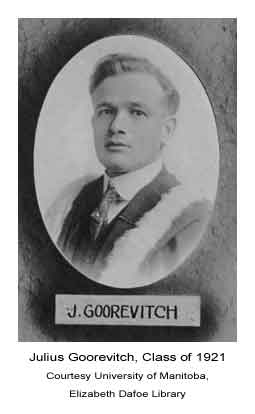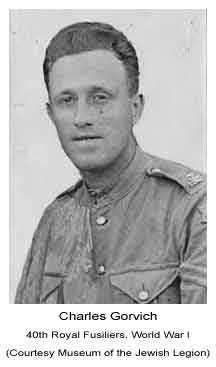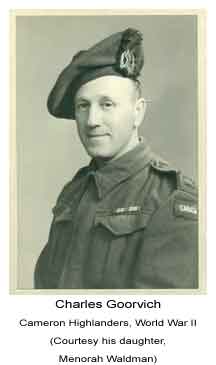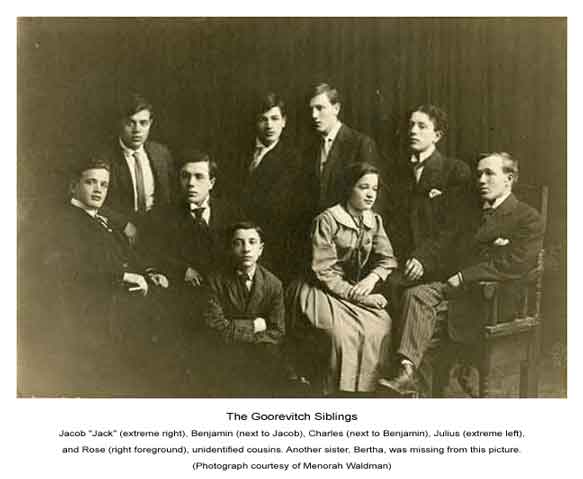
SSNS Home > Senior Years > Curricula 9-12 > Grade 11 > Canadian History > Remembrance Day > MAC Soldiers > Goorevitch

Goorevitch, (Pte) Sgt. Julius, Camper, Manitoba, Third Year Diploma (1915) B.S.A. (1921). Occupation: agricultural student. Military Service: Private, Corporal, Sergeant, Reg. No. 5538, “C” Co., 40th Bn., Royal Fusiliers, E.E.F [Egyptian Expeditionary Force] in Palestine. Attestation papers not found. For more information see Jewish Role in World War I.
Additional Biographical Information:
Born in 1889 in Russia, Julius Goorevitch immigrated with other family members to Western Canada in 1911 and settled at New Hirsch, a Jewish agricultural settlement located near the village of Camper about 150 km north of Winnipeg, Manitoba.[1] Sponsored by Baron Maurice de Hirsch, the colony flourished for a time, but eventually the economic, cultural, and religious opportunities of Winnipeg took the people to the city and the settlement ended. However, it lasted long enough to convert Julius Goorevitch into an enthusiastic agriculturalist; indeed, agriculture became the focus of his life work. Julius attended the Manitoba Agricultural College for three years (1912-1915) before going overseas, where he served in Palestine with other Jewish volunteers in the 40th Battalion, Royal Fusiliers, Egyptian Expeditionary Force of the British Army. After the war, he returned to Canada and completed his B.S.A. at the Manitoba Agricultural College in 1921.
This was about all the information about Julius Goorevitch that could be gleaned from the University of Manitoba Archives and other local sources. However, in March 2009, through a fortuitous set of circumstances, we located Michael Goorvich, a banker in Chicago and one of Julius’s grand-nephews.[2] Michael’s information was sketchy, but he knew that his great-uncle Julius went to Palestine where he had become an instructor in agriculture. He recalled that his own father, Saul Goorvich, had been holidaying during the 1960s in the Pacific Northwest, where he met some former students of his Uncle Julius, who had studied with him in Israel. On his return, Saul made an attempt to locate his Israeli cousins, but was unsuccessful. There had been no contact in the years since, as far as Michael knew; thus, it was evident that the two branches of the Goorevitch family had been separated for at least fifty years. The trail seemed cold indeed.
Nevertheless, Michael provided the names of other family members, including Menorah Waldman of Winnipeg, who was a vital link in the chain of discovery that was unfolding. Her father Charles Goorvich served in the Egyptian Expeditionary Force at the same time as his brother Julius, and she generously passed on a copy of his war record that she had obtained from the Museum of the Jewish Legion in Israel. In June 2009, we obtained a copy of Julius’s war record from the same museum. It contained the following additional information concerning “(Pte) Sgt.” Julius “Goorevich” of the “39 Royal Fuseliers.”
His studies were interrupted by the call-up to the Gedud [Jewish Brigade] in 1917. During military training in England, he met his future wife, daughter of an active Zionist family. After demobilisation, he took his B.Sc. [in Agriculture at the Manitoba Agricultural College], and went back to England where he married in 1921. The family intended leaving immediately for Palestine, but this was delayed. In England, he worked as an agricultural engineer, later on his own farm, in Kent, where one of the first “Hachsharoth”[3] in England was organised. In 1936, he finally came to Israel, where he continued his work in training farmers, including lecturing, articles, etc. He spent his last years in Kibbutz Beeri, with two of his children, and passed away therein 1958. All three of his children are in Kibbutsim [Kibbutzim].
Armed with this new information, our attempts to find Julius’s family now focused on Kibbutz Be’eri. There were obstacles. It was not a big place, and there was little on the Internet about it. Hebrew also appeared to be the main language spoken there. Still, it had a printing firm that was a major employer of the people on that kibbutz. It seemed likely that someone there could speak English and would be able to help us. It was now August, and six months since the research had begun, when we made an appeal to Be’eri Printers. We were not disappointed. On August 24, Vivian Silver, a company representative, emailed us with the news that she had forwarded our inquiry to Mona Ofer, Julius’s only surviving child. What followed was a delightful exchange of information that expanded Julius’s story.
Mona was somewhat surprised that we had found her, because her father had changed his name to Goodrich in England, and that was the name by which he was known in Israel. It is a testament to the good faith and persistence of the people at Be’eri Printers that she was found at all. Mona is 86 years of age [2009], and a wonderful correspondent. Not only does she communicate in excellent English, but she is handy with the computer as well. She kindly filled in the details of her father’s life that had eluded us for months.
Mona had been out of contact with her relatives in Canada for many years, although she recalled receiving letters, complete with illustrations, from her Uncle Charlie (Menorah’s father), when she was a girl in England. She also remembered that her uncle and other members of the family were received with great hospitality at her maternal grandmother’s home in England during World War II. This was a continuation of the hospitality that same grandmother and Mona’s grandfather Liebowitz had shown in World War 1 to the Jewish contingent when it arrived in England for training.
Julius was one of those young soldiers, whose idealism resonated with the ardent Zionism of the Leibowitzes. Their daughter Ann Leibowitz, caught his eye, too, but for quite different reasons. Julius and Ann corresponded during his service in the Middle East and after the war, when he returned to Winnipeg to complete his agricultural degree. Upon graduation in 1921, he returned to England, and they were married, after which they remained in that country for more than a decade. According to Mona, “He worked for a time with a dairy firm as his major at University was dairy farming. He also spent some time as a consultant with a commercial delegation from the Russian Soviet government, who came to England to acquire agriculture equipment.”
When Mona was old enough to take notice of such things, her father was running a poultry farm, “where he also trained young people who planned to go to settle in Palestine.” He wanted to emigrate as well, but it wasn’t until 1936 that he and his family were able to do so. Once settled there, her father
trained new immigrants and others in poultry farming. He introduced laying cages for chickens, and also sexing of newly hatched chicks (the males were destroyed as only the females were retained to lay eggs.) He wrote articles to the professional journals, and was very well known in the [agricultural] branch.
After his health began to fail, Julius joined Mona, her brother Michael, and their families at Kibbutz Be’eri, where he passed away in 1958. His son Michael, who died in 1998, also chose farming as his profession, although he later became a sports teacher. His other daughter, Pauline (Pnina), who passed away in 2008, lived with her family at another kibbutz in Northern Israel. Julius had nine grandchildren twenty-two grandchildren, and eight (so far) great-grandchildren.
 |
 |
Julius had three brothers and two sisters. His brother, Charles “Charlie” Samuel Goorevitch was conscripted into the Canadian army during World War I. According to his Attestation Papers, dated 28 May 1918, Charles was a student living with his wife on Magnus Avenue in Winnipeg at that time. However, he didn’t serve with the Canadian forces. He transferred to the Jewish Legion and went to the Middle East with the 40th Battalion (Reg. No. J5543), Royal Fusiliers, Egyptian Expeditionary Force, attaining the rank of sergeant. After demobilisation, Charlie returned to Winnipeg where he worked as a printer and was also instrumental in establishing the General Monash Branch of the Canadian Legion . During World War II, he entered the Canadian forces again, rising this time to the rank of Quarter Master Sergeant with the Cameron Highlanders. After demobilisation in 1944, he moved to Vancouver, where he helped organise the Fairview Branch of the Canadian Legion. Charlie died in military hospital after a lengthy illness on 20 November 1962. Menorah Waldman is his daughter.
Another brother Jacob (or Jack), grandfather of Michael and Lyle Goorvich, married Annie Gilmore, whom he met at New Hirsch. They eventually settled in Winnipeg, where he worked as a furrier. Michael Goorvich of Chicago is his grandson. Julius’s other brother was named Benjamin, an electrician, whose descendants live in Alberta. His two sisters were Rose and Bertha.

Letters of Julius Goorevich
We are fortunate, indeed, to have extracts from two of Julius’s letters written at the end of World War I and published in the March 1919 issue of Managra, the student journal of the Manitoba Agricultural College at that time. The letters provide valuable insights into the thinking of this fascinating individual at a pivotal time in World History. They read as follow:
1919
1. Extract from a note received by Prof. Jackson.
Arrived safe in Egypt. Feel very good and am quite content. Our camp is in one of the well known Egyptian deserts. All I have seen so far has made a profound impression. I shall try to describe it in my future correspondence.
My present address is 5535 Corp. J. Goorvitch
40th Bn. R.F., “D Co’y”
E.E.F. Egypt
University of Manitoba, Archives and Special Collections, Managra, v. XII, No. 1 (Jan. 1919),14.
2. Extracts From a Letter to Prof. Jackson, Written by Corp. Goorevitch, No. 5538, “C” Co., 40th Batt., Palestine, E.E.F.[Egyptian Expeditionary Force], on Christmas Day Last. – Editor.
Dear Prof. V. W. Jackson
Your most appreciated letter, bulletin, and newspaper clippings, received only a few days ago. Circumstances were such that I couldn’t reply then.
For the last few months we have been all the time on the go; most of the time “on the double.” At present I am for a few days on the E.E.F. Base where I am getting a rest.
Demobilization is swiftly going on. When my turn will come is very indefinite to me. As an Agriculturist I belong to the first industrial group and were it not for certain national reasons I could be soon home, however, I decided to stay on until the Jewish question in Palestine is settled.
I am very little informed of what is being done to enforce Mr. Balfour’s promise to the Jews, but I am certain that the British nation will stay by its pledge. It may only be a question of our readiness. For one who has not been in Palestine this is really a question, but a short visit by an observer puts the question in a different light, and he may ask, how is it that it has not belonged to the Jewish people at least for the last century.
The idea of Jewish nationalization is as old as the Dispersion. The doctrine of the return to Palestine has always been part and parcel of our belief. It is true that this return was looked upon not as an historic event but as a part of the Divine scheme of governance, however, with the advent of a more tangible view of cosmic development this belief was bound to take on a more human and terrestrial form.
The idea to restore Palestine to the Jews was of general European interest as far back as 1852.
An Englishman, Hollingsworth by name, published a pamphlet that year, wherein he advocated the establishment of a Jewish state, urging it as a matter of moment to Great Britain for the purpose of safeguarding the overland route to India.
No Christian, and perhaps no Jewish writer, has struck such a high note of pathos and enthusiasm as George Eliot in her novel “Daniel Deronda” (1876).
“There is a store of wisdom among us to found a new Jewish polity. Grand, simple, just like the out – a republic where there is equality of protection...Then our race shall have an organic centre, a heart and a brain to watch and guide, and execute; the outraged Jew shall have a defence in court of nations as the outraged Englishman or American, and the world will gain as much as Israel gains”
But there was no more potent factor in finally creating an interest in the larger aspect of the Jewish question than the attempt made to settle the Promised Land.
The foundation of the first Jewish agricultural colony, Patach-Tikwah, was laid in the year of 1874; the second in 1882, when immigrants from Russia and Roumania settled at Richon-de-Zion, Wart-el Chanin, and Rosh Pinnah, and Zichron-Jacob and many other places.
At present there are from 40 to 45 Jewish colonies with a population of over 20,000 cultivating an area of over 110,000 acres. This represents only 2 percent of the possible land for cultivation, and over 14 per cent of that cultivated by others in Palestine before today. These colonies are in Judea, Samaria, Gallilee [sic], and only one in Transjordania, where the best land for agricultural purposes is found, the land at present controlled by the wild Bedouins.
There is not so much difference between day and night in Palestine as between the Arab plantations and those of the Jewish, the latter pioneering only for the last 35 years.
The influence of the Jews on the cultural and economic development of Palestine is enormous.
The Jewish Agricultural Exp. Station has succeeded in isolating, in fact fixing a new form of seasame [sesame] which in yield is more than double the ordinary grown by the Arabs. It has acclimatized a variety of grapes, ripening three weeks earlier than the existing varieties of the region; it has improved several varieties of olives for plantation, both in average weight of the fruit and in quality of the oil. It has also created five species of wheat and barley which show an amazing power of resistance to the sirocco.[4] It has cultivated more than 40 varieties of plants designed to keep the dunes from shifting, it has also introduced more than 40 species of eucalyptus which are grown by the Jews in order to remove the stagnant pools which breed fevers, and is a good source for timber.
The collection of fresh water molluscs is one of the richest in the world. The cryptogramic and phaneogramic [sic] herbaria[5] each contains nearly 30,000 species, the latter in particular, contains a fairly large number of hitherto unknown plants.
The Hebrew high school and technical school in Jaffa are of the finest educational institutes in Europe.
The business organizations are also well developed. The Jews have formed co-operative societies for the sale of oranges, lemons and almonds, and have built the third biggest wine cellar in the world.
Considering that all this was done while under the Turkish yoke, whose interests in Palestine were merely inland duties which were as high as 8 per cent, in return giving but very poor protection from the wandering Bedouins, also after four years of war, no one can say that the Jews are incapable of becoming good agriculturalists.
As far as a future political order in Palestine is concerned if given to the Jews, I need not discuss it but refer to our prophets and the modern Jewish statesmen who shine the world over.
With this New Year we step into a new life, where justice and equality will be the keystone to all, and the Jews are looking forward to their rebirth. It is every honest man’s duty to help them, more so our own affair.
When I am discharged I shall stop in Palestine and do what I can for the noble cause of my nation. However I would like very much to keep in touch with the once adopted country, both for my personal protection and because of those who are near to me, besides the gratitude I owe to Canada for my education. I feel that a letter from you once in a while will help partially my longing for all I have left behind.
I am sincerely yours,
Corp. J. Goorevitch
University of Manitoba, Elizabeth Dafoe Library, Archives and Special Collections, Managra, v. XII, no. 3 (March 1919), 27-29.
Click on the footnote number to return to the text:
[1] The Goorevitch family immigrated to Canada from Baku, which at that time was controlled by Imperial Russia, but is now capital of an independent Azerbaijan. A Jewish community still exists there. Email correspondence between Michael B. Goorvich and Raymond Shirritt-Beaumont, 17 November 2009.
[2] Finding Michael was relatively straight-forward. Efforts to locate the name “Goorevitch” in Winnipeg’s phone directory were fruitless. The only entry anywhere close to it was “S. Goorvich,” and there was never an answer when we called the associated telephone number. Later, we discovered that this “Goorvich” was Michael’s widowed mother, Sara, and as we surmised, she was down south for the winter! The next step was to do an Internet research which brought up a Michael Goorvich in Chicago, who had been educated at the University of Manitoba. This was encouraging. Conveniently, Michael had a business email address online, so we contacted him. Voila! Within half an hour, he had replied and the research began in earnest.
[4] The Sirocco is a dry desert wind originating in the Sahara of North Africa.
[5] The reference here to “cryptogramic and phanerogamic herbaria” would have been readily understood by Prof. Jackson, who was a botanist. A herbarium is a collection of dried plants; a “herbaria” is more than one such collection. Cryptogramic” refers to ferns and mosses that lack true flowers or seeds. “Phanerogamic” refers to the Phanerogamia, meaning flowering, seed-bearing plants. The error in spelling was probably made when the letter was typeset for Managra, either because the handwriting was difficult to read or more likely because the typesetter was unfamiliar with technical botanical terms.